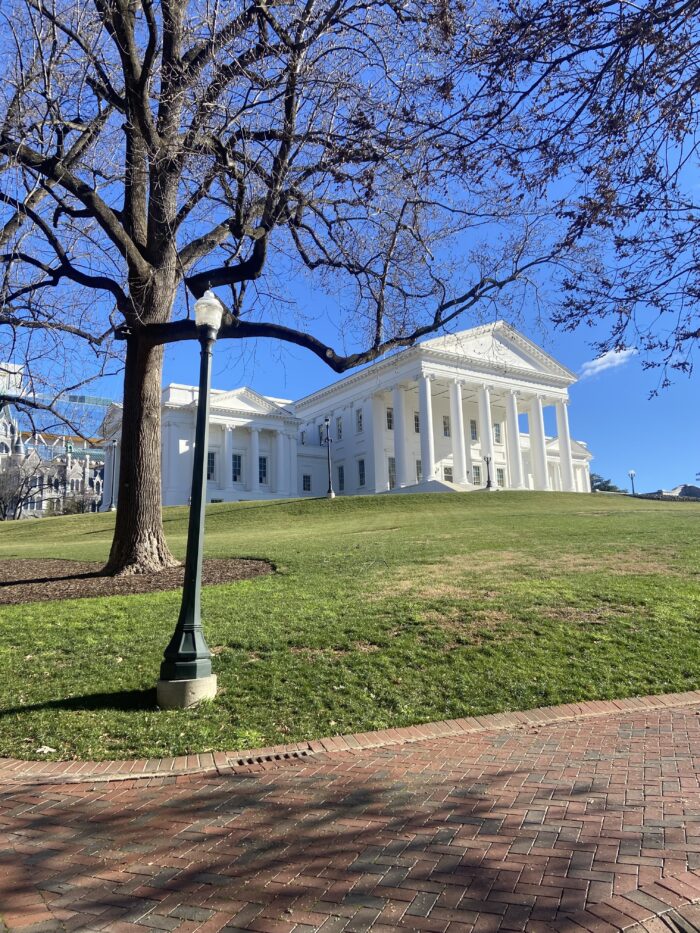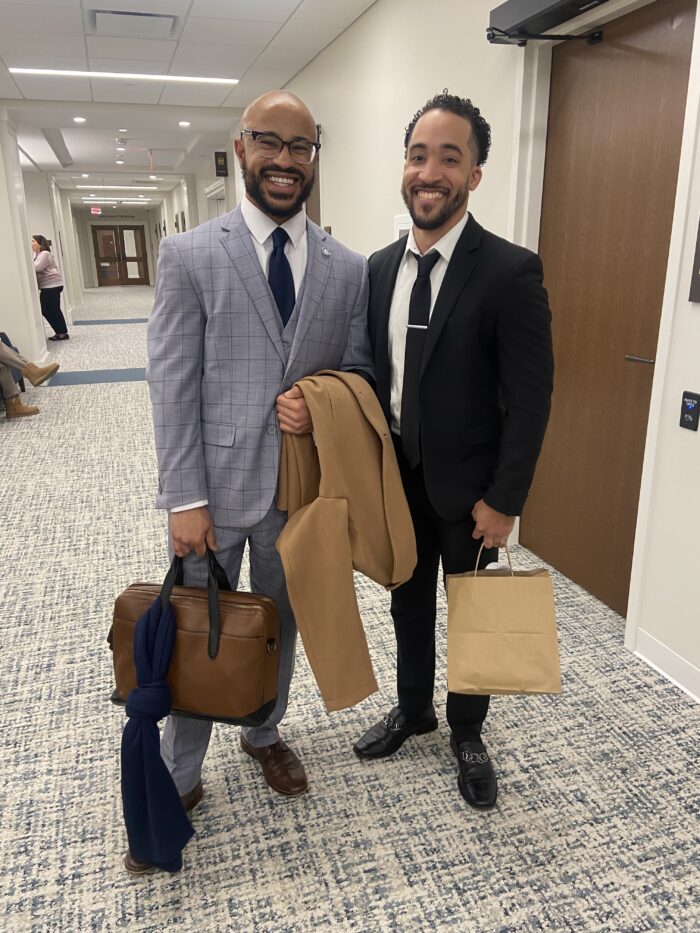What’s in store for the 2024 Virginia General Assembly session?
Virginia’s 2024 General Assembly session is in full swing. This year, the state’s elected officials will be operating against the backdrop of an unprecedented number of new General Assembly members, with the slightest majority of seats being held by Democrats.
Our legislative priorities this year focus on continuing to achieve clean air, clean water and a healthy environment for all.
Emily Francis, Senior Policy and Outreach Manager

Each year, SELC spends time in Richmond working with groups from across the state, as well as lawmakers, to advance environmental policies that benefit all communities.
The 2024 session promises to be a busy one as we and our partners seek to protect Clean Cars Standards that were passed during the 2021 session and build on gains that have already been made because of the 2020 passage of the Virginia Clean Economy Act (VCEA).
“Our legislative priorities this year focus on continuing to achieve clean air, clean water and a healthy environment for all,” said Emily Francis, senior policy and outreach manager based in SELC’s Richmond office. “We look forward to working with returning and newly elected officials to identify and advance meaningful solutions to our most pressing environmental challenges.”
Fighting for clean transportation
The Youngkin administration and numerous legislators keep trying to repeal Clean Cars Standards the General Assembly adopted under the previous administration. These standards are one of the most important tools we have to reduce tailpipe pollution — and transportation is by far the largest source of carbon pollution in the Commonwealth. The Clean Cars Standards require manufacturers to reduce emissions from all cars and light-duty trucks they deliver to Virginia and to deliver an increasing percentage of zero-emission vehicles — primarily EVs — over time.
Attempts to roll back these standards must be defeated.
Trip Pollard, Senior Attorney
Efforts to spread misinformation about the standards have intensified, and several bills have already been filed for the 2024 session to repeal the Clean Cars Standards. SELC is continually working to counter these myths and to defend the standards.
“SELC will continue fighting to defend and implement the Clean Cars Standards,” said Trip Pollard, leader of SELC’s Land and Community Program. “These standards provide significant environmental, health, consumer, and economic benefits, and attempts to roll back these standards must be defeated.”
The General Assembly also needs to take additional steps to accelerate adoption of cleaner vehicles, such as funding EV purchase rebates and funding rural EV charging infrastructure.
SELC will work this session to protect current funding for rail and transit, including opposing Governor Youngkin’s proposal to shift some funds that would have gone to rail and transit to a slush fund for transportation projects connected to speculative economic development projects. We also will work to increase transit funding, particularly in Northern Virginia.
Protecting Virginia’s clean energy gains, while also making improvements

When VCEA was passed in 2020, it wasn’t just a hallmark piece of climate and energy policy in the South, it was a national win too. The law provides a clear pathway for Virginia’s transition to a carbon-free electric grid. Among other things, the law established ever-increasing renewable energy requirements for Virginia’s two major utilities, ultimately requiring Dominion Energy to deliver electricity from 100% renewable sources by 2045. Appalachian Power must meet the same goal by 2050. The law also either removed or modified restrictions that were hindering clean energy developments like rooftop solar from taking off in Virginia, and paved the way for significant investment in solar, offshore wind, and battery storage projects.
During this session, we are aiming to make the energy economy more competitive as well as increase affordability and reliability. Specifically, we are part of a coalition that would like the General Assembly to empower the utility commission (called the State Corporation Commission) to approve more third-party solar projects than currently allowed, which are typically cheaper and less risky for customers than projects built by a utility like Dominion.
We need to turbocharge our residential and shared solar programs to keep our clean energy transition on track.
Josephus Allmond, Staff Attorney
On the shared solar front, we are working with partners to expand access to solar for Virginians who want to go solar but cannot install rooftop solar themselves. We are supporting efforts to lower Dominion’s minimum bill to subscribe to a shared solar program, establish a shared solar program for Appalachian Power, and incorporate incentives into each program for shared solar development on rooftops, brownfields, landfills, and as dual use agricultural facilities.
Transforming coal mines to shared solar.
Press play to hear from SELC Staff Attorney Josephus Allmond.
For residential solar, we are working with partners on efforts to create strong mandatory consumer protection measures, to authorize solar leasing, and to create an inclusive utility investing program.
Lastly, to reduce impacts to important natural resources, we’re working with partners on an effort to incentivize solar projects on parking lot decks.
“We need to turbocharge our residential and shared solar programs to keep our clean energy transition on track,” said Josephus Allmond, who leads the Virginia Energy team’s solar work.
Healthy, protected wetlands equal clean water for Virginians
Three out of every four Virginians get their drinking water from surface waters like rivers and lakes. Wetlands across the Commonwealth help protect drinking water by filtering out pollution before it gets into these source waters. Wetlands provide critical habitat and clean water for fish and wildlife statewide, from waterfowl prized by duck hunters to the fish and shellfish Virginians love to catch and eat. Wetlands also help prevent or lessen flooding by absorbing heavy rains and storm surges, which are unfortunately increasing in frequency. This is why we will be touting the benefits of wetlands and the longstanding protections already in place in Virginia during the 2024 session. These laws are more important than ever to maintain as pollution and other threats increase.
“This promises to be a very busy session, but we are optimistic about the opportunity,” said Emily Francis. “For nearly 40 years, SELC has stood up for Virginia’s environment, working on behalf of the people and places we cherish, and we will continue to do so.”
